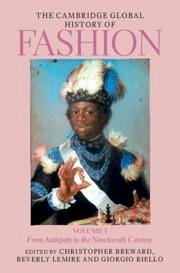"Over the twentieth century multi-disciplinary academic studies addressed dress practice and bodily adornment from a variety of perspectives, assessing the question of fashion, though few communities outside the West were awarded this term until the past generation. Anthropologists took an ethnographic stance, with works that from the late 1980s became more attentive to the lived significance of clothing that reflected 'agency, practice and performance' with local and global impact.1 Anthropological studies revealed how clothing resisted and critiqued imperial perspectives, including choices of bodily adornment, integral to community coherence, transforming priorities and social dynamism. These examinations, across world terrains, became richly nuanced with vital studies of evolving clothing systems, including those entangled with decolonization, political changes, and material challenges. The significance of this scholarship affected other disciplinary fields, from history and art history, to cultural and museum studies, with modes of close looking and analysis, as increasing numbers of scholars explored the important matter of 'the social skin'. As Terence Turner observed: 'Decorating, covering, uncovering or otherwise altering the human form in accordance with social notions of everyday propriety or sacred dress, beauty or solemnity, status or changes in status, or on occasion of the violation and inversion of such notions, seems to have been a concern of every human society of which we have knowledge. ... the symbolic stage upon which the drama of socialization is enacted'.2 Studies of clothing revealed its variable efficacy as a tool to discipline colonized peoples, as well as a tool of resistance; while gender practices and the critical resistance of norms were also lively fields of study. Critical analyses of clothing modes opened wideranging, cross-cultural studies on the subject of dress and fashion, attentive to the dialogic relationship between colonies and metropoles and other societal forms"--
Hinweis: Dieser Artikel kann nur an eine deutsche Lieferadresse ausgeliefert werden.
Hinweis: Dieser Artikel kann nur an eine deutsche Lieferadresse ausgeliefert werden.








